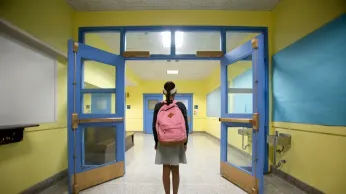
4 hours ago
Federal Appeals Court Strikes Down Ohio School Policy Banning Intentional Misgendering of Transgender Students
READ TIME: 2 MIN.
In a landmark decision issued in November 2025, the U.S. Sixth Circuit Court of Appeals concluded that the Olentangy Local School District in Ohio cannot punish students for refusing to use their transgender peers' preferred pronouns, finding that such disciplinary measures infringe upon students’ First Amendment rights to free speech and religious expression . The decision follows a lawsuit brought by Parents Defending Education, representing families who argued that the district’s anti-harassment policy, which classified intentional misgendering as discriminatory conduct, violated their children's rights .
The case, known as Parents Defending Education v. Olentangy Local School District, centered on the district's anti-harassment and bullying policies, which were interpreted to mean that refusing to use a student’s affirmed pronouns could result in disciplinary action . Parents and advocacy groups expressed concern that the policy compelled speech on a sensitive matter—gender identity—and infringed on students' religious or scientific beliefs .
The full en banc panel of the Sixth Circuit held that the district’s approach amounted to viewpoint discrimination—a violation of the First Amendment—because it required students to affirm ideas with which they might fundamentally disagree . The court emphasized that schools must demonstrate that such speech causes substantial disruption or constitutes actionable harassment under state law in order to justify disciplinary action .
LGBTQ+ advocacy organizations have voiced strong concern about the ruling’s potential impact on the well-being and safety of transgender students. Groups such as Lambda Legal and the Human Rights Campaign argue that policies restricting intentional misgendering are vital for creating safe, affirming environments for transgender and nonbinary students, and that the court’s decision could open the door to increased harassment and marginalization .
Legal experts note that the ruling does not prevent school districts from intervening in cases of bullying or harassment that rise to the level of substantial disruption or create a hostile environment, but it does raise the bar for what qualifies as actionable misconduct regarding pronoun use . In dissent, several judges argued that the district should retain broad authority to protect transgender students from targeted harassment, warning that the decision could undermine these protections .
This decision comes amid a wave of legal battles across the United States over the rights of transgender students and the responsibilities of public schools under federal civil rights laws such as Title IX. The Supreme Court has recently declined to hear related cases, leaving lower court precedents intact and deepening legal uncertainty for school districts nationwide .
For educators and policymakers, the Sixth Circuit’s ruling highlights the challenges of balancing inclusive, nondiscriminatory educational environments with constitutional protections for student expression. Many districts are now reviewing their policies to ensure compliance with the decision while reaffirming their commitment to supporting transgender and nonbinary students .
As the legal landscape continues to evolve, LGBTQ+ advocates stress the importance of clear guidance and robust support for transgender students to ensure their rights and dignity are protected in schools across the country .






